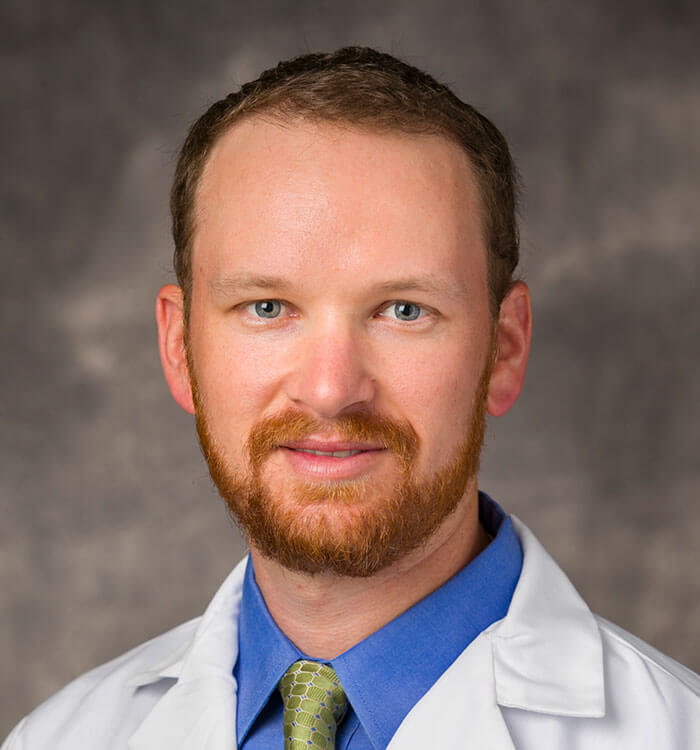University Hospitals Ear Nose & Throat Institute Participates in $17 Million Post-COVID Study
February 15, 2022
Innovations in Ear, Nose & Throat | Winter 2022
University Hospitals Cleveland Medical Center and its partner organizations Case Western Reserve University, the MetroHealth System and the Louis Stokes Cleveland VA Medical Center will receive $17 million of $470 million the National Institutes of Health (NIH) has allocated for a study of new or lingering symptoms following SARS-CoV-2 infection.
 Bryan D'Anza
Bryan D'AnzaThe Researching COVID to Enhance Recovery (RECOVER) initiative is a nationwide investigation into post-acute sequelae of COVID (PASC), often referred to as long COVID.
The Northeast Ohio study, known as NEO-CURE, is the only site in the state awarded funding through RECOVER’s implementation phase. Under the direction of Contact Principal Investigator Grace McComsey, MD, FIDSA, Vice President of Research and Associate Chief Scientific Officer at University Hospitals, NEO-CURE will enroll and follow more than 900 COVID survivors over the next four years.
Volunteers recruited throughout a diverse cross-section of Cleveland communities will be asked to participate in the study through questionnaires, clinical exams and laboratory tests. The study team will determine which specialists each patient needs to see based on individual symptoms.
Relevant patient data will be digitally scraped from electronic medical records and amalgamated with information from over 17,000 patients enrolled in the RECOVER study. Leveraging and expanding existing biorepositories, the Ohio arm of the meta-cohort study will contribute to national efforts to better understand, prevent and treat the long-term effects of coronavirus.
Brian D’Anza, MD, is leading the UH Ear, Nose & Throat Institute research efforts to study and treat patients experiencing ENT-related PASC. Clinically concerning when symptoms persist three or more months beyond the acute phase of infection, the most common ENT complaint is loss or distortion of sense of smell or taste.
“Looking at the data collected, can we start to predict which individuals might be at higher risk?” Dr. D’Anza says. “By conducting a large-scale analysis of phenotypes, we hope to gain an understanding of specific characteristics that may correlate with smell or taste loss.”
Study participants experiencing anosmia undergo a standard ENT workup, including appropriate imaging or nasal endoscopy to screen for anatomical anomalies, nasal polyps, lesions or chronic sinus inflammation. They also complete the UPSIT® comprehensive smell identification test. Current treatments showing promise include a type of cognitive behavioral therapy focused on smell retraining and steroid irrigation.
“Clinically, there have not been strong options for treating loss of smell or taste,” Dr. D’Anza says. “Our hope is that this study will lead to further therapy development.” Other PASC symptoms he and his ENT colleagues are treating include mouth or throat pain, dry mouth, hearing problems and dizziness.
Assessing national impact
Preliminary estimates suggest that 10 to 30 percent of COVID survivors will develop PASC, ranging from mild to significantly debilitating health consequences, negatively impacting patients’ quality of life. In response, leading researchers are coming together in an unprecedented national collaboration to tackle the myriad health and societal challenges resulting from SARS-CoV-2 infection.
While millions of Americans from all socioeconomic backgrounds have contracted COVID, research indicates that racial and ethnic minority populations are experiencing greater risk of hospitalization and symptom severity.
Multiple social determinants of health potentially impact COVID exposure and recovery, including employment sector, income level, insurance coverage, access to healthcare provider, and inequities related to nutrition and housing. The RECOVER consortium seeks to understand these and other disparities to determine effective and equitable treatment.
“Early findings bear out that COVID has disproportionately affected underserved minority populations,” Dr. D’Anza says. “By engaging various racial and ethnic groups affected by PASC, the goal is to learn what makes folks more susceptible to the long-term impact of COVID and identify interventions that are applicable across diverse populations.”
For more information, email Dr. D’Anza at Brian.D’Anza@UHhospitals.org or call 216-844-5037.
Contributing Expert:
Brian D’Anza, MD
Department of Otolaryngology/Head & Neck Surgery
Medical Director for Digital Health and Telehealth
University Hospitals Cleveland Medical Center
Assistant Professor, Otolaryngology -Head and Neck Surgery
Case Western Reserve University School of Medicine


